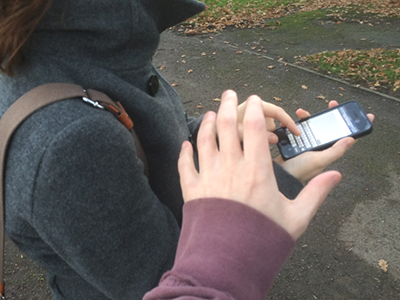With the latest iPhone 6 and Samsung hitting the market, smart phones are big business. They are also big business for phone thieves operating on Dublin streets, throughout Ireland and around the world in large.
A mobile is stolen every twenty minutes in Ireland, 314 are stolen in London every day and in the US, a staggering 113 “cell” phones are lost or stolen with each passing minute.
So, what would you do if this happened to you?
I have lost count of the number of people who have contacted the school and who have had their mobile phone stolen-or ripped from their hand as they were talking on it.
Firstly, let me highlight two things to start this article.
- Never use your phone in a public place, unless absolutely necessary.
- If your phone is snatched from your hand, NEVER ever give chase.
Many of the smart phones available today cost anywhere from €200 – €1000. Would you walk down a crowded street with this amount of cash in your hand for everyone to see? Well this is exactly what you are doing when you walk & talk or walk & text. The predator just see’s your possession as something to be exchanged for cash or possibly some form of contraband. iPhone and iPad theft is big right now. There is a ever growing criminal economy developing around stolen iPhones and iPads.
Thefts are often violent, conducted by one or more perpetrators, and in broad daylight. So pay attention no matter where you are. Avoid using your smartphone when you are alone. A lot of thefts occur on buses, the theft happens so fast, and the thief is gone like a flash, and a lot of victims are women.
Whatever you do, make sure you backup your contact list to your mobile service provider’s servers. Put it on automatic update, so that every time you add a new contact or change an existing contact, your contact list on the phone carrier’s servers is automatically updated. Should you lose or have your smartphone stolen, you can quickly retrieve your contact list intact, and not be inconvenienced.
Never, ever save your user ID’s and passwords, or vital information like credit card numbers, social security numbers on your smartphone. If you do lose your smartphone, you could quickly become a victim of identity theft and the thief could take money out of your bank account or charge things to your credit cards.
Protect Yourself Before or After Your Phone is Lost or Stolen
A decade ago, losing your mobile phone wasn’t a huge deal. Sure, the loss of your text message history, contacts might be a painful blow, but you’d be able to get a replacement and move on quickly. Nowadays, our smartphones reveal much more; our phones are packed with our close friends, Facebook contacts, photos, location data, and tweets as well as access to personal banking, shopping and social networking tools.
Fortunately, security advancements have kept up with smartphone development, so remote locking, tracking and wiping is an easy-to-setup reality. These apps, many of which are free, only take a few minutes to install on everything from your iPhone to the latest Windows Phone device, so we urge you to take the time to install one.
Taking just a few security precautions with your phone can turn the potential disaster of a phone accidentally left in a taxi or on a bus into a minor inconvenience. When you discover that your iPhone has been stolen, dozens of thoughts race through your head all at once. Anger, worry, surprise are all likely to pop up. Once they pass, though, there are some steps you should take. While there’s no guarantee that these steps will get your phone back, they won’t hurt and will succeed in some cases.
Report it to Police
File a report with the police in the city where the phone was stolen. This may or may not directly lead to the recovery of your phone, but having documentation of the theft may help in dealing with network providers and insurance companies and, if you can get data about the location of your phone, having the police report on file may be necessary for getting the police to help you recover it.
Notify Your Employer
If your iPhone was issued to you through work, notify your employer of the theft immediately. In that situation, you may even want to do this prior to filing the police report, since your corporate IT department may be able to prevent the thief from accessing critical business information. Your employer may have given you guidelines about what to do in case of theft when they issued the phone to you. It’s a good idea to brush up on them.
Change Your Passwords
Don’t let the thief gain access to other accounts whose passwords may be saved on your phone. Changing your email account passwords will prevent the thief from sending mail from your phone. Additionally, changing online banking, iTunes, and other important account passwords will prevent identity theft or financial theft.
Call Your Mobile Phone Company
Some mobile phone company representatives may be more inclined to take action when you’ve got a police report, others may act right away without one. Calling your mobile phone company to report the theft and have the account tied to the phone suspended or cancelled will help ensure that you’re not stuck paying for charges incurred by the thief.
Track an iPhone
There are a number of ways to use the phone’s built-in GPS to track a stolen phone. Apple’s free Find My iPhone service and many third-party apps from the App Store will help you locate the phone geographically. Getting this data can be crucial for recovering the phone. Some of these apps, including Find My iPhone, also allow you to remotely change security settings.
Don’t Try to Recover It Yourself – Get Police Help
If you’ve been able to locate your stolen phone via a GPS-based tracking app, never try to recover it yourself. Going to the house of the person who stole your phone is a certain recipe for trouble. Instead, contact the Garda you filed the report with, make sure to have your report information at hand and let them know that you’ve got additional information about the location of the stolen phone. The police ought to be willing to recover the phone for you.
Delete Data
If you can’t get the stolen phone back, or it’s taking too long, you may want to delete the phone’s data. You can do this over the web using Mobile Me or some of the other tracking apps. This won’t prevent the thief from using your phone, but at least they won’t have access to your personal data after that. If your phone was issued to you by your employer, your IT department may be able to remotely delete the data, too. Contact them to learn about your options.
Call phone Insurance Company
If You Have One If you’re using a third-party insurance company to protect your phone, and your policy covers theft, be sure to call the company. Having a police report will be a big help here. If you can recover the phone with the help of the police all the better, but reporting the situation to the insurance company will get the ball rolling in the meantime and help you replace your phone if you can’t recover it.
Notify People
If your phone’s gone and you weren’t able to track it via GPS and/or delete its data, you’re probably not going to get it back. In that case, you should notify the people in your address book and email accounts of the theft. They probably won’t be getting calls or emails from the thief, but in case the thief has a bad sense of humour, you’ll want people to know that it’s not you sending them trouble making emails.
In Summary
- Never use your phone in a public place unless absolutely necessary. If you must, go into a shop or cafe and stay aware.
- Never use the headphones in your phone while walking/jogging etc. This applies to sending and receiving calls or listening to music.
- Never text while walking in public place.
- If a criminal demands your phone, my advice is, hand it over. The phone can be replaced, your Life can not.
- Try to schedule times to text or call.

